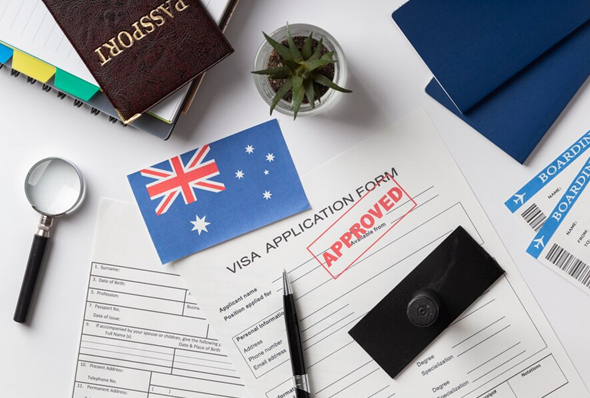The refusal rates for student visa applications from certain countries like Nepal have increased sharply lately, in some cases by 50% or more, announced by the Australian government.
These shocking visa rejection rates are serious alarming signals for all parties involved, including students. This is understandably due to negligence or ignoring the application requirements set by the Australian government and education providers.
Studying abroad is an important step in your lifelong journey, which requires proper researching and planning to minimise risks of rejection. Taking these alarms seriously and avoiding the addition of any visa refusal to their migration history is very important - Otherwise, not only will you lose your opportunity to study abroad, but any visa rejection in your record will make it even harder to be granted a student visa in the future.
The main reason for increased visa rejections is the lack of compliance to Genuine Temporary Entrance (GTE) requirements.
As per the Australian government, international students must be able to show that they come to Australia for study purposes and can meet the GTE requirements. Students must keep GTE as a magic keyword in mind and carefully follow its guidelines to increase their chances of visa applications.
To prevent visa refusal from happening, we have covered 6 areas of focus in the GTE requirements to help strengthen your visa application. Take a read!
1. Finance
You must show that you can fund your living and study costs while studying in Australia.
The source of the funding must be clearly presented with verifiable supporting documents. This might be genuine savings over a reasonable time, steady income arising from employment or from running a business, equitable assets like investment properties and shares, bank loans, and scholarships.
You need to provide official transactions issued by verifiable and official sources. For example, if you are presenting employment income, you must show official documents like payslips from your employer. If you are providing bank loans, make sure to get them from registered banks, as private banks may not be acceptable to the immigration department.
2. Strong ties with your home country
It is important to show that you have strong ties with your home country as incentives to return to your home country after your studies.
You can demonstrate this by showing that you have business, cultural and social connections. If you have dependent family members who will stay in your home country during your studies, you can also provide this as part of your commitment to going back to your home country.
3. Gap years
Gap years after the school's year 12 is another criterion that will affect the success of your students and visa applications. The more gaps you have, the more difficult it is to justify it.
Ideally, you should start your overseas studies right after completing year 12 or within two years after completing your year 12. This will avoid creating any major gaps, and help you to start your dream studies without any or minimum delays.
If you have gap years, you must be able toreasonably justify it. For example, you might be working to save money for your dream studies, or you have been working to gain experience relating to your dreamed higher education courses. If you have had any medical conditions, financial problems, or any other compassionate reasons, you can present them with supporting documents.
4. Employment status in your home country
Any employment experience and opportunities in your home country can help to both fill the gap and to show that you are actively contributing to your community. It will be even more useful if you can show that your employment is related to your future studies. This claim must be supported by valid and verifiable documents like the appointment letter specifying your position, duration of employment, and regular payslips. The documents must be in an official format and letterheads and show the contact details of the employer.
5. Future employment opportunities
You need to show how your proposed course is related to your future employment. You can describe this by specifying the employment opportunities that you will gain after completing your studies. For example, you might provide a business plan and relate it with the knowledge and experience that you would gain during your proposed courses. You may also show that your knowledge and experience are required by certain employers. You can support this by providing an employment offer from your current employer or even from another related employer.
6. Immigration history
Your immigration history can affect your student visa application, hence, you must be careful to avoid any risky applications and keep your immigration profile clean. If you have any prior overseas visa, particularly to Australia, it will be considered as a supporting point and if you have any visa rejection, it can adversely affect your student visa application. This means that if you are not ready yet, do not rush for a risky application. Instead, plan to improve your situation. For example, if your finance is not ready or your IELTS is not at a satisfying level, make a timely plan to improve these conditions and then apply.
Take note of these 6 points when you're preparing for GTE in your visa application, and you can minimize the risks of visa refusal. Additionally, since agents are your main contact in guiding and assisting you throughout your application, make sure to find one that can adhere to these 6 guidelines described above, and treat you as a source of value!
Final words
Don't let increased visa rejection set you back! As long as you take the requirements set by the Australian government and the education providers seriously, you can maximise the chance of starting your dream course. Act quickly and wisely!
Related Blogs
-

Preparing the GTE for Student Visa in Australia
Have you decided to pursue education in Australia? If you have already set your heart on studying .....
-

Latest Update on Australian Student Visas
Introduction of the Genuine Student Criterion Are you contemplating pursuing your studies in Aus .....
-

The Best Guide to Understand the Australian Student Visa (subclass 500)
Australia attracts international students with its world-class education system and vibrant cultural .....